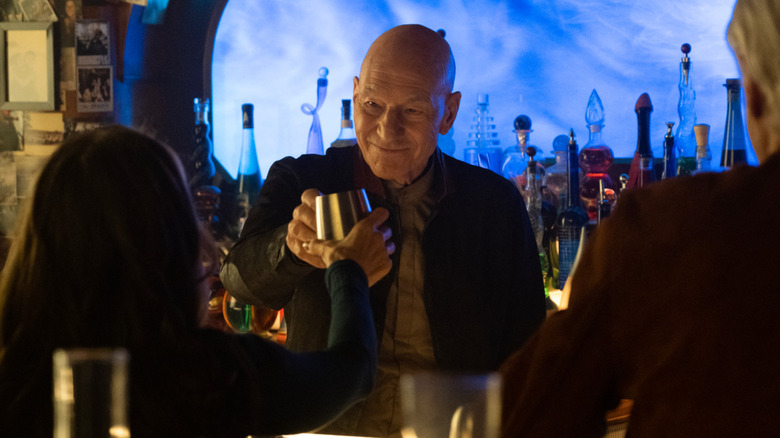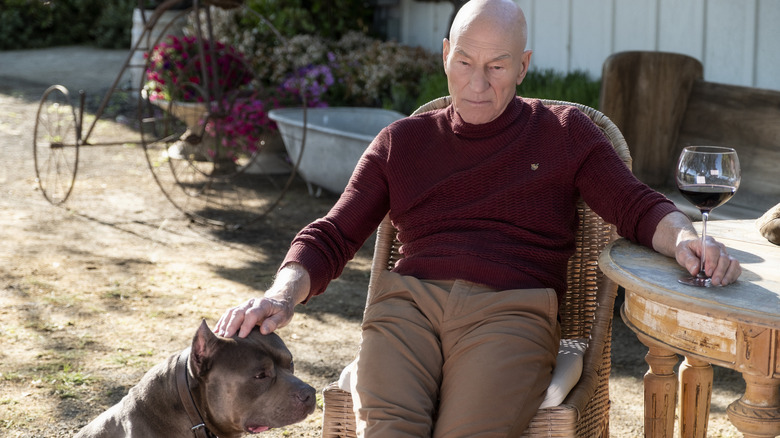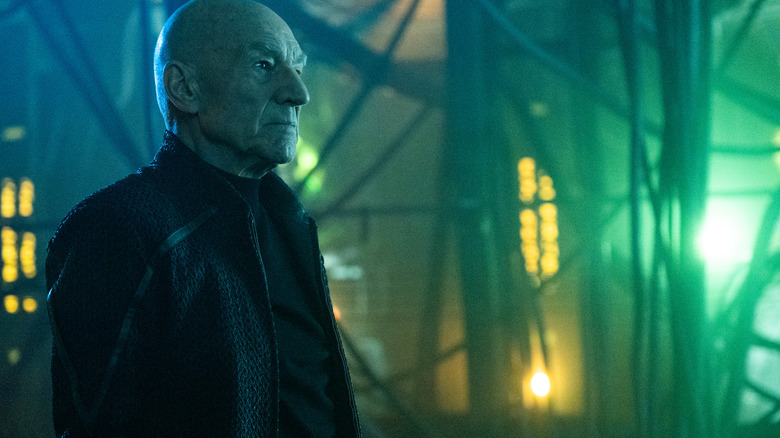Patrick Stewart Himself Filled In The 20-Year Gap Between Star Trek: The Next Generation & Picard
Because the characters in "Star Trek" tend to mark the passage of time by Stardates, it takes some delving by resourceful Trekkies to find when the various "Trek" shows take place on the Gregorian calendar. "Star Trek: The Next Generation," said Trekkies have found, began in the year 2364 and lasted until 2370. "Star Trek: Generations" took place in '71, "First Contact" in '73, "Insurrection" in '75, and "Nemesis" in '79. After a well-documented 15 years with the "Next Generation" cast, it seemed that they would move on with their lives and audiences would no longer be privy to their adventures.
Of course, that all changed in 2017 with the launch of CBS All Access, later renamed Paramount+, and the sudden abundance of "Star Trek" the new streaming platform wanted to provide. Many new "Star Trek" shows were put into production, including "Star Trek: Picard," a series about the off-duty shenanigans experienced by the captain of the "Next Generation" Enterprise. Patrick Stewart, in his late 70s, returned to the role after 15 years, but it seems five additional years had passed within the "Star Trek" continuity; the first season of "Picard" took place in 2399 when the character was 94. Incidentally, season 2 took place in 2400 or 2401. The third season took place a decade after in 2411. Picard, by then, was 105.
At the start of "Picard," Jean-Luc, now an admiral, had retired to his vineyards in France, idly distributing wine and flirting with his housekeeper Laris. The 20 years since "Star Trek: Nemesis" were not expressly filled by the series, nor, it seems, by the "Picard" showrunners. In an interview with the Los Angeles Times, Stewart revealed that he had to fill in the time gap more or less on his own.
What was Picard up to?
Patrick Stewart revealed that it was Alex Kurtzman, the executive producer of all things "Star Trek," who asked him to fill in the missing 20 years himself:
"I think it was Alex Kurtzman who said, 'Look, 20 years have passed, and in those 20 years, surely a lot has happened to you, Patrick. I know enough about your life to know there have been upheavals and changes. Surely, the same has happened to Jean-Luc Picard. What might those things be?' Well, I actually invented a whole story about those missing years."
Stewart's approach to Picard's backstory wasn't so much driven by storytelling, but by character. How did Jean-Luc Picard, he pondered, get to be in the emotional state he appears to be in at the start of his series? For Stewart, it was more important to think of the things that hadn't happened to Picard than construct a scripted backstory. The most notable feature of the 2399 Picard was that he was neither married nor coupled. Picard, Stewart felt, should begin with shattered dreams:
"[T]his may sound a little pretentious, but to create that past — which I assume will never, ever be known — was very intimate, and it influenced me when we began shooting 'Picard.' Because I knew he had needs, longings, desires that were not being fulfilled. Disappointment that things had not gone the way he had hoped. Loneliness. Separation from these people he had loved and admired."
It wouldn't be until the show's third season that audiences would learn of an ill-fated affair with Beverly Crusher (Gates McFadden) and a long-lost son he never knew about. This is in keeping with Stewart's ideas.
Picard is unhappy
Patrick Stewart has gone back and watched some of "Star Trek: Picard," and realized that he made his character even more miserable than he really wanted to. It seemed that it was Picard's destiny to remain ever unhappy. Everything ended well for the character when "Star Trek: The Next Generation" concluded, but "Nemesis" ended with the death of Data (Brent Spiner) and Picard witnessing the death of his evil clone Shinzon (Tom Hardy). Picard learned that if he had been raised in a mine and was systematically abused by evil Romulans, that he would have become a supervillain. It's not the most uplifting message.
The next 20 years would be unhappy for Jean-Luc. Stewart even found that some of his co-stars occasionally mocked him for his over-the-top anger, notably for a line he screamed in "Star Trek: First Contact." He explained:
"There are moments when I look at scenes in 'Picard' and think, 'Poor guy, he looks terrible. He's having such a bad time.' That wasn't my intention, but that was what was being communicated. Anxiety, stress, irritation. I never yelled as Picard — I mean, I may have done — 'The line must be drawn here!,' for which I was made fun of for decades. Actually, there was one like it in the last episode, and I thought, 'At least, because there aren't any more episodes, nobody will be making fun of me.' We made fun of one another a lot."
Stewart may have been relieved to no longer face the gentle teasing of his co-stars, but audiences may also be relieved to see a "Star Trek" story that ends with Picard alive, healthy, happy, and not alienated from his old friends. One must picture Picard happy.


